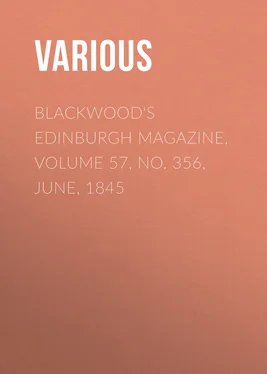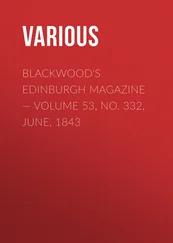Various - Blackwood's Edinburgh Magazine, Volume 57, No. 356, June, 1845
Здесь есть возможность читать онлайн «Various - Blackwood's Edinburgh Magazine, Volume 57, No. 356, June, 1845» — ознакомительный отрывок электронной книги совершенно бесплатно, а после прочтения отрывка купить полную версию. В некоторых случаях можно слушать аудио, скачать через торрент в формате fb2 и присутствует краткое содержание. Издательство: Иностранный паблик, Жанр: foreign_antique, periodic, foreign_edu, на английском языке. Описание произведения, (предисловие) а так же отзывы посетителей доступны на портале библиотеки ЛибКат.
- Название:Blackwood's Edinburgh Magazine, Volume 57, No. 356, June, 1845
- Автор:
- Издательство:Иностранный паблик
- Жанр:
- Год:неизвестен
- ISBN:нет данных
- Рейтинг книги:5 / 5. Голосов: 1
-
Избранное:Добавить в избранное
- Отзывы:
-
Ваша оценка:
- 100
- 1
- 2
- 3
- 4
- 5
Blackwood's Edinburgh Magazine, Volume 57, No. 356, June, 1845: краткое содержание, описание и аннотация
Предлагаем к чтению аннотацию, описание, краткое содержание или предисловие (зависит от того, что написал сам автор книги «Blackwood's Edinburgh Magazine, Volume 57, No. 356, June, 1845»). Если вы не нашли необходимую информацию о книге — напишите в комментариях, мы постараемся отыскать её.
Blackwood's Edinburgh Magazine, Volume 57, No. 356, June, 1845 — читать онлайн ознакомительный отрывок
Ниже представлен текст книги, разбитый по страницам. Система сохранения места последней прочитанной страницы, позволяет с удобством читать онлайн бесплатно книгу «Blackwood's Edinburgh Magazine, Volume 57, No. 356, June, 1845», без необходимости каждый раз заново искать на чём Вы остановились. Поставьте закладку, и сможете в любой момент перейти на страницу, на которой закончили чтение.
Интервал:
Закладка:
The body was accompanied by Turgénieff. Púshkin had more than once said to his wife, that he desired to be buried in the monastery of the Assumption at Sviatogórsk, where his mother had recently been interred. This monastery is situated in the government (province) of Pskoff; and in the riding of Opótchkoff, at about four versts from the country-house and hamlet of Mikháilovskoë , where Púshkin passed several years of his poetic life. On the 4th, at nine o'clock in the evening, the corpse arrived at Pskoff, from whence, conformably to the excellent arrangements made by the provincial government, it was forwarded on the same night, and the morning of the 5th, through the town of Ostroff to the Sviatogórsk monastery, where it arrived as early as seven o'clock in the evening. The dead man glided to his last abode, past his own deserted cottage, past the three beloved firs which he had planted not long before. The body was placed upon the holy hill ( sviatáia gorá , from which the monastery takes its name,) in the cathedral church of the Assumption, and a requiem was performed in the evening. All night long workmen were employed in digging a grave beside the spot where his mother reposes. On the following day, as soon as it was light, at the conclusion of divine service, the last requiem was chanted, and the coffin was lowered into the grave, in the presence of Turgénieff and the peasants of Púshkin's estate, who had come from the village of Mikháilovskoë to pay the last honour to their kind landlord. Very strangely to the ears of the bystanders sounded the words of the Bible, accompanying the handful of earth as it was cast upon Púshkin—" earth thou art! "
THE NOVEL AND THE DRAMA
You tell me, my dear Eugenius, that you are hesitating between the novel and the drama: you know not which to attack; and you wish me to give you some suggestions on the subject. You are candid enough to say that it is not point-blank advice that you ask, which you would probably heed just as much as good counsel is generally heeded by those who apply for it; but you would have me lay before you such ideas as may occur to me, in order that you may have the picking and choosing amongst them, with the chance of finding something to your mind—something which may assist you to a decision. Artists in arabesque get an idea by watching the shifting forms of the kaleidoscope; in the same manner you hope—if I will but turn my mind about a little—that some lucky adjustment of its fragments of observation may help you to a serviceable thought or two. At all events, you shall not have to complain of too much method in what follows.
If I could only, my dear Eugenius, persuade you to leave them both alone!—drama and novel both! But this is hopeless. The love one bears to a woman may be conquered—not indeed by good counsel, but by speedy flight; but the passion that draws us to poetry and romance can only die out, it cannot be expelled; for in this passion, go where we will, we carry our Helen with us. She steals upon us at each unguarded moment, and renews in secret her kisses upon our lip. Well, if I cannot persuade you to leave both alone, my next advice is that you attack both; for if you endeavour to express in either of these forms of composition all that is probably fermenting in your mind, the chance is that you spoil your work.
And by all means lay your hands first upon the drama. True, it is the higher aim of the two, and I will not pretend to augur any very brilliant success. But still it is the more appropriate to the first ebullitions of genius, and the spasmodic efforts of youth. The heart is at this time full of poetry, which, be its value what it may, must be got rid of before the stream of prose will run clear. Besides, the very effort of verse seems necessary to this age, which disdains a facile task, and seeks to expend its utmost vigour on its chosen labour. Moreover, to write a good novel one should have passed through the spring-time and enthusiasm of youth—one should be able to survey life with some degree of tranquillity; neither wrapped in its illusions, nor full of indignation at its discovered hollowness. At two-and-twenty, even if the heart is not burning with fever heat of some kind—some enthusiastic passion or misanthropical disgust—the head at least is preoccupied with some engrossing idea, which so besets the man, that he can see nothing clearly in the world around him. At this age he has a philosophy, a metaphysical system, which he really believes in, (a species of delusion the first to quit us,) and he persists in seeing his dogma reflected to him from all sides. This is supportable, or may be disguised in poetry; it becomes intolerable in prose. Add to all which, that the writer of a novel should have had some experience in the realities of life, a certain empirical knowledge of the manner in which the passions develop themselves in men and women. The high ideal forms of good and evil he may learn from his own heart; but there is in actual life, so to speak, a vulgar monstrosity which must be seen to be credited. I can figure to myself the writer of a drama musing out his subject in solitude, whether the solitude of the seashore or of a garret in London; but the successful novelist must have mingled with the world, and should know whatever the club, the drawing-room, and, above all, the boudoir can reveal to him.
Of course it is understood between us, that in speaking of the drama we make no reference to the stage. Indeed, you can hardly contemplate writing for the stage, as there is no stage to write for. We speak of the drama solely as a form of composition, presented, like any other, to the reader. I have heard the opinion expressed that the drama, viewed as a composition designed only to be read, is destined to be entirely superseded by the novel, which admits of so great a variety of material being worked into its structure, and affords an unrivalled scope for the development both of story and of character. To me it seems that the drama, especially in its more classic form, apart from its application to the stage, has a vitality of its own, and will stand its ground in literature, let the novel advance as it may.
All the passions of man represent themselves in his speech, the great prerogative of the human being; almost every thing he does is transacted through the medium of speech, or accompanied by it; even in solitude his thoughts are thrown into words, which are frequently uttered aloud, and the soliloquy is wellnigh as natural as the dialogue. Give, therefore, a fair representation of the speech of men throughout every great transaction, and you give the best and truest representations of their actions and their passions, and this in the briefest form possible. You have all that is essential to the most faithful portrait, without the distraction of detail and circumstance. With a reader of the drama the eye is little exercised; he seems to be brought into immediate contact with the minds of those imaginary persons who are rather thinking and feeling, than acting before him. To this select representation of humanity is added the charm of verse, the strange power of harmonizing diction. If the drama rarely captivates the eye, it takes possession of the ear. May it never lose its appropriate language of verse—that language which so well comports with its high ideal character, being one which, as a French poet has happily expressed it, the world understands, but does not speak—
"Elle a cela pour elle—
Que le monde l'entend, et ne la parle pas!"
The drama is peculiarly appropriate to the ideal; and it seems to me that the very fact, that whatever appertains to the middle region of art, or requires the aid of much circumstance and detail, has found in the novel a far more perfect development, ought to induce us to purify the drama, and retain amongst us its most exalted type. It is in vain that it strives to compete with the novel in the intricacy of its plot, in the number of its dramatis personæ , in the representation of the peculiarities, or as they used to be called, the humours of men. These have now a better scene for their exhibition than the old five-act play, or tragi-comedy, could afford them; but the high passions of mankind, whatever is most elevated or most tender, whatever naturally leads the mind, be it good or evil, to profound contemplation—this will still find its most complete, and powerful, and graceful development in the poetic form of the drama.
Читать дальшеИнтервал:
Закладка:
Похожие книги на «Blackwood's Edinburgh Magazine, Volume 57, No. 356, June, 1845»
Представляем Вашему вниманию похожие книги на «Blackwood's Edinburgh Magazine, Volume 57, No. 356, June, 1845» списком для выбора. Мы отобрали схожую по названию и смыслу литературу в надежде предоставить читателям больше вариантов отыскать новые, интересные, ещё непрочитанные произведения.
Обсуждение, отзывы о книге «Blackwood's Edinburgh Magazine, Volume 57, No. 356, June, 1845» и просто собственные мнения читателей. Оставьте ваши комментарии, напишите, что Вы думаете о произведении, его смысле или главных героях. Укажите что конкретно понравилось, а что нет, и почему Вы так считаете.












